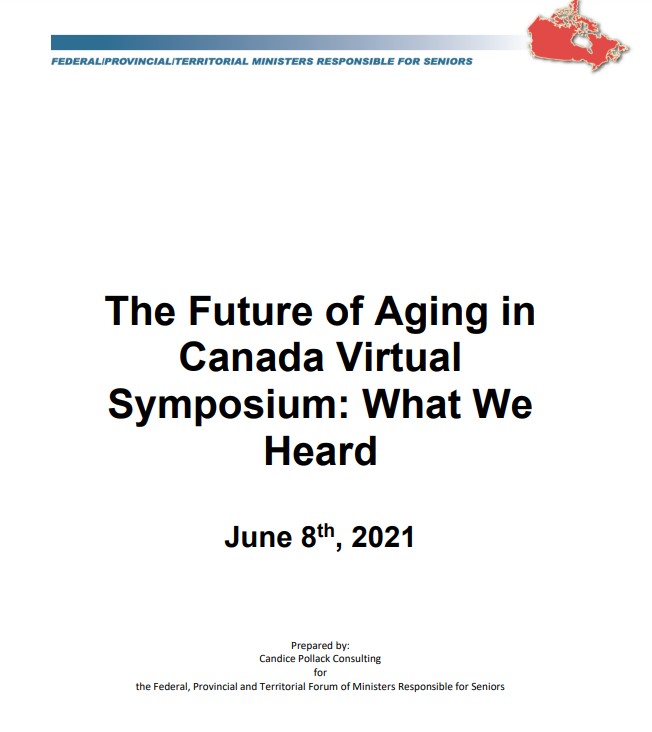 On June 8, 2021, the Federal, Provincial, Territorial Forum of Ministers Responsible for Seniors hosted a Virtual Stakeholder Symposium on the future of aging in Canada. With help from national partner organizations, AGE-WELL NCE, the Canadian Association of Gerontology, the Canadian Network for the Prevention of Elder Abuse, and United Way Centraide Canada, the Symposium explored 4 key themes:
On June 8, 2021, the Federal, Provincial, Territorial Forum of Ministers Responsible for Seniors hosted a Virtual Stakeholder Symposium on the future of aging in Canada. With help from national partner organizations, AGE-WELL NCE, the Canadian Association of Gerontology, the Canadian Network for the Prevention of Elder Abuse, and United Way Centraide Canada, the Symposium explored 4 key themes:
- technology to support seniors aging in community
- research and innovation in healthy aging
- addressing and preventing elder abuse
- emerging best practices in supports for seniors and responding to social isolation
This report offers an overview of the topics addressed during the Symposium.
Source: Federal, Provincial, Territorial Forum of Ministers Responsible for Seniors
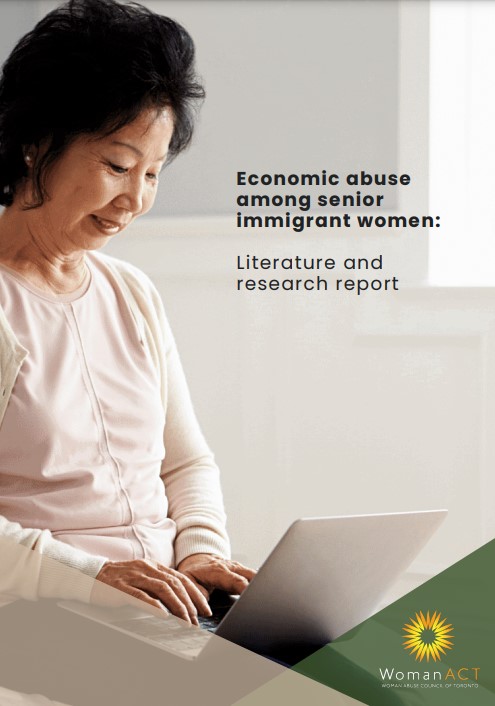 "The Senior Immigrant Women at Risk of Economic Abuse project undertook community engagement and research to better understand the unique experiences of economic abuse among senior immigrant women.
"The Senior Immigrant Women at Risk of Economic Abuse project undertook community engagement and research to better understand the unique experiences of economic abuse among senior immigrant women.
Senior immigrant women occupy intersecting identities of gender, age and immigration. Each of these have been known to impact experiences of gender-based violence and help seeking. Furthermore, these intersections can create specific risk factors related to economic abuse.
The project undertook research to highlight the unique experiences and risk factors and help build capacity of community agencies to identify and respond to economic abuse among senior women. The project completed community consultations, a literature review and community-based research. The first part of this report explores the existing research on economic abuse among senior immigrant women. The second part of this report contains findings from community-based research undertaken with service providers and senior immigrant women with lived experience of economic abuse."
Source: WomanAct
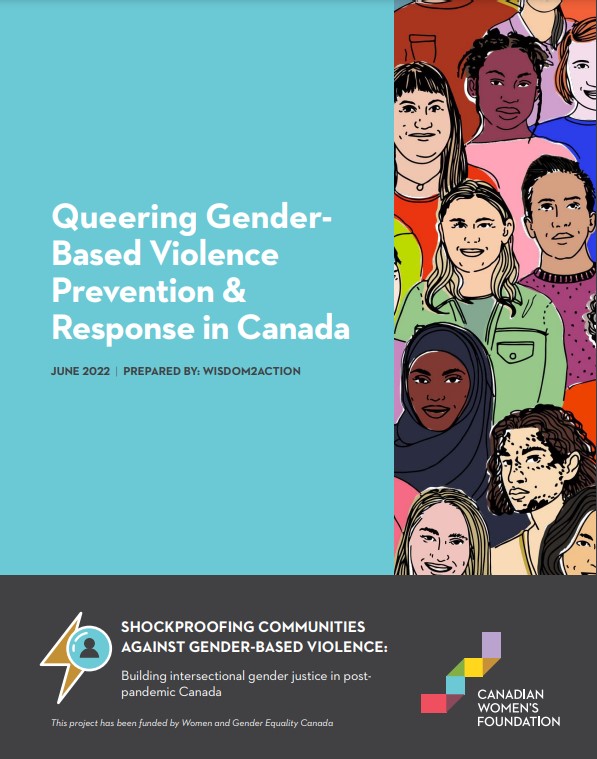 "Gender-based violence (GBV) in 2SLGBTQ+ communities is pervasive but stigmatized; it is both hyper-visible and invisibilized, known and neglected. Transphobia, homophobia, and biphobia are structural forms of GBV that 2SLGBTQ+ communities navigate every day in their public and private lives. 2SLGBTQ+ communities experience family violence, intimate partner violence (IPV), sexual violence, and street harassment, but are outsiders to GBV services built for cis, straight, white women. In fact, 2SLGBTQ+ people face discrimination and further GBV while accessing GBV services and reporting GBV, compounding the violence.
"Gender-based violence (GBV) in 2SLGBTQ+ communities is pervasive but stigmatized; it is both hyper-visible and invisibilized, known and neglected. Transphobia, homophobia, and biphobia are structural forms of GBV that 2SLGBTQ+ communities navigate every day in their public and private lives. 2SLGBTQ+ communities experience family violence, intimate partner violence (IPV), sexual violence, and street harassment, but are outsiders to GBV services built for cis, straight, white women. In fact, 2SLGBTQ+ people face discrimination and further GBV while accessing GBV services and reporting GBV, compounding the violence.
This report presents the findings from a literature review, focus group, and interviews. It presents what we know about the scale and scope of GBV impacting 2SLGBTQ+ communities, looking at the experiences of queer and trans Black, Indigenous and people of colour (QTBIPOC), refugees and newcomers, trans+ people, queer women, youth, sex workers, and people living rurally or remotely. In addition to looking at family violence, IPV, sexual violence, and street harassment, the report highlights the compounding GBV that 2SLGBTQ+ people face when accessing services and reporting GBV. This report then turns to existing violence prevention and survivor support programs and points to the gaps and needs 2SLGBTQ+ communities are naming. We look at promising practices and offer opportunities and recommendations for funders and service providers. The report concludes with suggestions for mobilizing knowledge about GBV prevention and response for 2SLGBTQ+ communities."
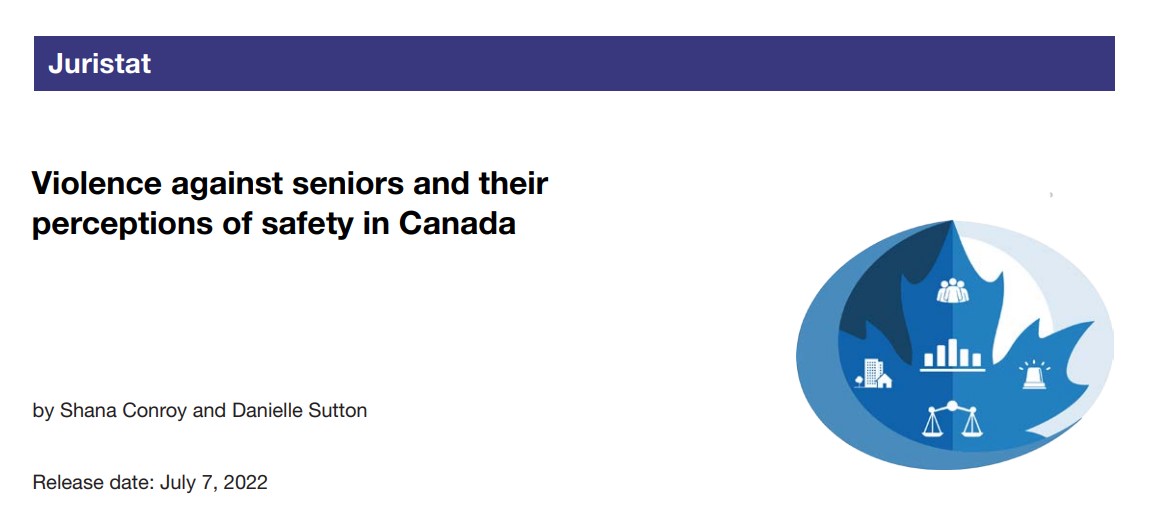 "Overall, older Canadians are aging better, are more active and are engaging in fuller lifestyles than previous generations. At the same time, however, they remain at risk of experiencing violence at the hands of family members, intimate partners, friends, caregivers and others (Miszkurka et al. 2016). Among seniors, a greater proportion (54%) are women in large part due to women living longer, on average, than men. The gender mortality gap, however, has diminished in recent years and is forecasted to continue shrinking in light of increased life expectancy among Canadian men (Statistics Canada 2019a). The growing proportion of seniors in Canada highlights the importance of understanding their risk of being victimized and, relatedly, their perceptions of safety and feelings of security. When seniors experience victimization, knowing where it occurs, who perpetrates it and whether it is reported to the police is crucial to understanding and mitigating risk
"Overall, older Canadians are aging better, are more active and are engaging in fuller lifestyles than previous generations. At the same time, however, they remain at risk of experiencing violence at the hands of family members, intimate partners, friends, caregivers and others (Miszkurka et al. 2016). Among seniors, a greater proportion (54%) are women in large part due to women living longer, on average, than men. The gender mortality gap, however, has diminished in recent years and is forecasted to continue shrinking in light of increased life expectancy among Canadian men (Statistics Canada 2019a). The growing proportion of seniors in Canada highlights the importance of understanding their risk of being victimized and, relatedly, their perceptions of safety and feelings of security. When seniors experience victimization, knowing where it occurs, who perpetrates it and whether it is reported to the police is crucial to understanding and mitigating risk
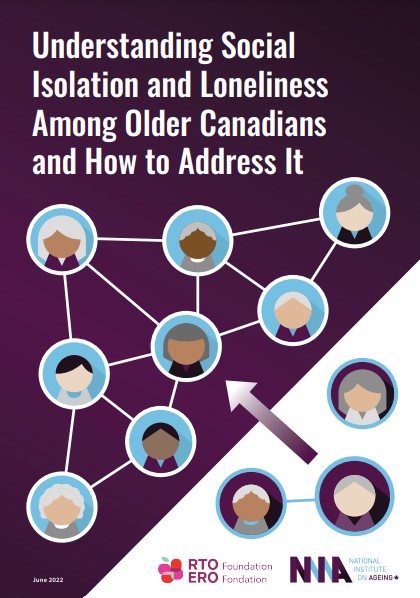 Social isolation and loneliness are increasingly recognized as important public health concerns. Globally, as well as in Canada, these issues have significant implications for the health and well-being of older persons. Older adults are at increased risk of experiencing social isolation and loneliness, and are especially vulnerable to their negative impacts. With older persons making up a rapidly growing proportion of Canada’s population, the number of either isolated or lonely older adults is also expected to increase, meaning that both the individual and societal consequences of loneliness and social isolation are expected to become more severe. As such, it is important to fully understand the prevalence and consequences of social isolation and loneliness in Canada, and to work to implement effective, evidencebased strategies to reduce their impacts and better support healthy ageing. (...). While Canada has launched several national initiatives to address social isolation and loneliness, few sustainable, long-term strategies have been adopted, despite a clear recommendation from the federal government’s National Seniors Council (NSC) to do so almost a decade ago in 2013.
Social isolation and loneliness are increasingly recognized as important public health concerns. Globally, as well as in Canada, these issues have significant implications for the health and well-being of older persons. Older adults are at increased risk of experiencing social isolation and loneliness, and are especially vulnerable to their negative impacts. With older persons making up a rapidly growing proportion of Canada’s population, the number of either isolated or lonely older adults is also expected to increase, meaning that both the individual and societal consequences of loneliness and social isolation are expected to become more severe. As such, it is important to fully understand the prevalence and consequences of social isolation and loneliness in Canada, and to work to implement effective, evidencebased strategies to reduce their impacts and better support healthy ageing. (...). While Canada has launched several national initiatives to address social isolation and loneliness, few sustainable, long-term strategies have been adopted, despite a clear recommendation from the federal government’s National Seniors Council (NSC) to do so almost a decade ago in 2013.
Source: National Institute on Aging
Page 3 of 20

















